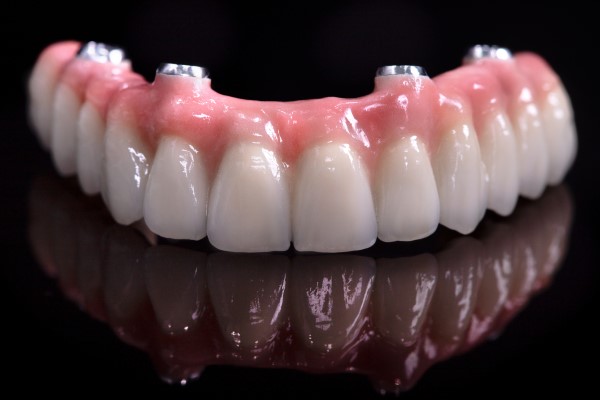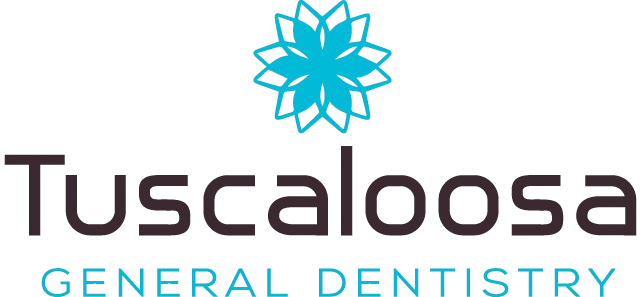Fixed Dentures
Fixed dentures, often referred to as screw-retained or implant-supported dentures, are a type of dental prosthetic securely attached to dental implants embedded in the jawbone. Unlike traditional dentures, these are not removable by the patient. They can be an excellent option for individuals missing several or all teeth, as they provide a permanent solution that feels and functions similarly to natural teeth.

Types of Fixed Dentures in Tuscaloosa, AL
- All-on-4 implants: Uses four implants to support a full arch of teeth, minimizing the need for bone grafting.
- All-on-6 implants: Similar to All-on-4, but it uses six implants per arch, offering additional support and longevity.
- Hybrid dentures: Also referred to as “fixed detachable dentures,” these are typically attached to a metal bar and screw directly onto implants, giving a hybrid effect between a bridge and a denture.
Procedure for Fixed Dentures (Screw-Retained Dentures) in Tuscaloosa, AL
Initial Consultation and Evaluation
- Comprehensive examination: The process begins with a thorough dental examination. The dentist evaluates the patient’s oral health, including the condition of remaining teeth, gums, and jawbone.
- Diagnostic imaging: X-rays, CT scans, or 3D imaging may be used to assess bone density and structure, helping the dentist determine if the patient has enough bone to support the implants.
- Treatment planning: Based on the evaluation, the dentist will create a personalized treatment plan, discussing the number of implants needed and the type of fixed denture that will best meet the patient’s needs.
Preparing for Surgery
- Bone grafting (if necessary): If the patient has significant bone loss, bone grafting may be required to build up the jawbone before implants can be placed. This procedure can take several months for the graft to heal and integrate with the existing bone.
- Oral hygiene instructions: Patients will receive guidance on maintaining good oral hygiene leading up to the surgery to minimize the risk of infection.
Surgical Placement of Implants
- Anesthesia: On the day of the surgery, the patient will be given local anesthesia, sedation, or general anesthesia, depending on the complexity of the procedure and the patient’s preference.
- Implant placement: The dentist makes small incisions in the gums to expose the jawbone. Holes are drilled into the bone to place the titanium implants, which will act as artificial tooth roots.
- Closure: After the implants are placed, the gums are sutured back in place. In some cases, a temporary denture may be placed while the implants heal.
Osseointegration
- Healing Period: After surgery, there is a healing period of about three to six months, during which the implants undergo osseointegration. This process involves the jawbone growing around and fusing with the titanium implants, providing a stable foundation for the fixed dentures.
- Follow-up appointments: Regular follow-up visits will be scheduled to monitor the healing process and ensure there are no complications.
Abutment Placement
- Second surgery (if applicable): If the implants are placed with healing caps, a second minor surgery is necessary to attach abutments to the implants. Abutments are small connectors that will hold the denture in place.
- Healing of gums: After abutments are placed, the gums are allowed to heal for another couple of weeks.
Custom Fabrication of the Denture
- Impressions: The dentist takes impressions of the mouth to create a custom denture that fits precisely over the abutments.
- Denture creation: The denture is fabricated using high-quality materials to ensure it looks natural and functions properly. This process can take several weeks.
Fitting the Fixed Denture
- Final appointment: Once the denture is ready, the patient returns for the final fitting.
- Adjustment and securing: The dentist will place the fixed denture over the abutments and secure it using screws. Adjustments may be made to ensure a comfortable and proper bite.
- Final instructions: The dentist will provide care instructions and recommendations for maintaining oral hygiene with the new fixed dentures. Contact us to learn more.
Benefits of Fixed Dentures
Fixed dentures has several advantages over traditional dentures and even other types of implant-supported options:
- Stability and comfort: Fixed dentures don’t shift or move, reducing discomfort and prevents gum irritation.
- Improved bite functionality: Fixed dentures can restore up to 90% of your natural bite strength, enabling you to eat a wider range of foods.
- Natural look and feel: These dentures are custom-made to match your facial structure and look natural, enhancing your smile and appearance.
- Prevention of bone loss: The implants stimulate the jawbone, reducing the risk of bone deterioration that typically follows tooth loss.
- Low maintenance: Unlike removable dentures, fixed dentures don’t need to be removed nightly, simplifying your oral hygiene routine.
Maintenance and Care of Fixed Dentures in Tuscaloosa, AL
Maintaining fixed dentures requires regular cleaning and professional care to ensure their longevity:
- Daily cleaning: Brush and floss around the implant sites and denture carefully. Special brushes, like interproximal brushes, can help clean around the abutments.
- Routine dental check-ups: Visit your dentist in Tuscaloosa, AL at least twice a year to monitor the health of your implants and ensure there are no issues with the prosthetic.
- Avoid hard or sticky foods: Though fixed dentures are sturdy, it’s best to avoid very hard or sticky foods that could damage them.
- Nightly cleaning: A water irrigator can help clear debris around the implant areas, preventing bacterial buildup.
Are Fixed Dentures Right for You?
Fixed dentures are suitable for individuals seeking a long-term, reliable solution to tooth loss. Ideal candidates include those with sufficient jawbone density, good oral hygiene habits, and a commitment to long-term care. However, they may not be suitable for everyone, such as those with certain medical conditions or severe bone loss, which might require extensive grafting.
Conclusion
Fixed dentures are a stable, aesthetically pleasing solution for individuals with significant tooth loss. As a long-term alternative to traditional removable dentures, they restore both functionality and confidence. With advancements in dental implant technology, fixed dentures are more accessible, comfortable, and effective than ever. For those seeking a permanent and natural-looking solution, fixed dentures could be the ideal choice. Consult with our dentist to determine if this transformative treatment is right for you and experience the renewed freedom and comfort it brings.
Ready to achieve your best smile? Schedule your appointment with Dr. John Carlson at Tuscaloosa General Dentistry today! Call us at (205) 553-4477 or visit us at 631 Helen Keller Blvd #200, Tuscaloosa, AL 35404, and let us help you on your journey to optimal dental health.
Composite Bonding
Implant-Supported Dentures
Denture & Partials
Dental Implant Restoration
Dental Bridges
Composite Dental Fillings
Restorative Dentistry
Sports Mouth Guards
Oral Cancer Screening
Fluoride Treatment
Dental Cleaning & Exams
General Dentistry
Teeth Whitening
Dental Bonding
Cosmetic Dentistry
Complex Case Solutions
Veneers
Night Guards / TMJ Treatment
Crowns
TMJ Treatment


Office Hours
MON8:00 am - 5:00 pm
TUE8:00 am - 5:00 pm
WED8:00 am - 5:00 pm
THU7:00 am - 3:00 pm
FRIClosed
SATClosed
SUNClosed




